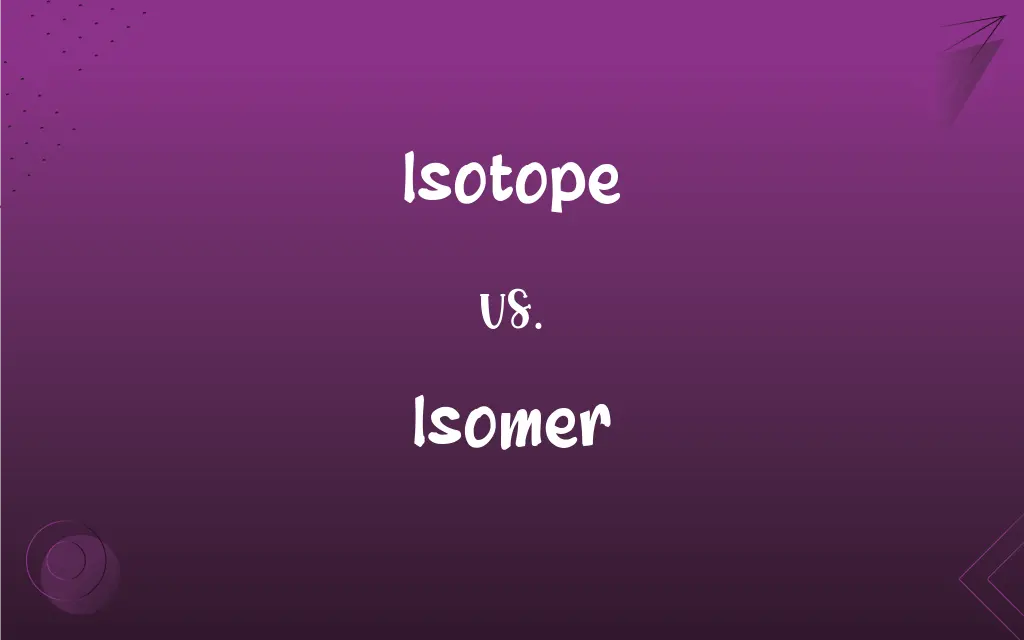Isotope vs. Isomer: What's the Difference?
By Harlon Moss & Janet White || Updated on March 4, 2024
Isotopes are variants of elements with the same number of protons but different numbers of neutrons. Isomers are molecules with the same molecular formula but different arrangements of atoms.

Key Differences
Isotopes pertain to the field of nuclear chemistry and physics, focusing on variations within elements. Each isotope of an element shares the same atomic number, indicating an identical number of protons, but differs in the number of neutrons within the nucleus. Isomers, on the other hand, are a concept from organic and inorganic chemistry that involves molecules rather than individual atoms. Isomers have the same molecular formula, meaning they contain the same number and types of atoms, but these atoms are arranged differently in space.
The distinction between isotopes and isomers is fundamental, as isotopes relate to variations within single elements and their nuclei, while isomers concern the arrangement of atoms within molecules. Despite their similarities in atomic or molecular makeup, the practical implications for their differences are vast, affecting everything from nuclear energy and radioactive dating (isotopes) to the functionality and behavior of chemicals in biological systems (isomers).
Isotopes are utilized in various applications, including medical imaging, radioactive dating, and as tracers in biochemical research, owing to their radioactive properties or differences in mass. Isomers, due to their varied chemical properties despite having the same types of atoms, play critical roles in pharmaceuticals, where different isomers of a drug can have drastically different therapeutic effects or toxicities.
Both isotopes and isomers deal with entities having the same basic components (protons in the case of isotopes and types of atoms for isomers), their differences lie in their nuclear composition for isotopes and the arrangement of atoms for isomers, leading to distinct behaviors and applications in science and technology.
Comparison Chart
Definition
Variants of an element with the same number of protons but different numbers of neutrons.
Molecules with the same molecular formula but different arrangements of atoms.
ADVERTISEMENT
Field
Nuclear chemistry and physics.
Organic and inorganic chemistry.
Key Difference
Number of neutrons.
Arrangement of atoms.
Examples
Carbon-12 and Carbon-14 (both have 6 protons but differ in neutrons).
Butane and isobutane (same formula, C4H10, different structure).
Chemical Behavior
Generally, isotopes of an element behave similarly in chemical reactions.
Isomers can have significantly different chemical properties.
Applications
Medical imaging, radioactive dating, tracers in research.
Pharmaceuticals, material science, food chemistry.
ADVERTISEMENT
Isotope and Isomer Definitions
Isotope
Variants of elements with different neutron counts.
Hydrogen has three isotopes: protium, deuterium, and tritium.
Isomer
Molecules with identical formulas, different structures.
Glucose and fructose are isomers (C6H12O6) with different sweetness levels.
Isotope
Naturally occurring or artificially created.
Technetium-99m is a man-made isotope used in medical diagnostics.
Isomer
Can exhibit drastically different properties.
Thalidomide's isomers vary in therapeutic effect and teratogenicity.
Isotope
Identified by mass number.
Carbon-14 is used in radiocarbon dating.
Isomer
Includes structural and stereoisomers.
Trans-fat and cis-fat are stereoisomers with different health impacts.
Isotope
Same chemical behavior, different physical properties.
Uranium-235 and uranium-238 are used differently in nuclear reactors.
Isomer
Crucial in pharmaceuticals and chemistry.
The right isomer can determine a drug's success and safety.
Isotope
Important for nuclear chemistry and physics.
Isotopic analysis helps trace environmental and biological processes.
Isomer
Studied for understanding molecular behavior.
Isomerism illustrates the significance of molecular structure in chemical reactions and biological systems.
Isotope
One of two or more atoms having the same atomic number but different mass numbers.
Isomer
(Chemistry) Any of two or more substances that have the same molecular formula but differ in the way their atoms are connected to each other, in the spatial orientation of their atoms, or, in the case of large molecules such as DNA, in their molecular topology.
Isotope
(nuclear physics) Any of two or more forms of an element where the atoms have the same number of protons, but a different number of neutrons within their nuclei. Thus, isotopes have the same atomic number but a different mass number.
Isomer
(Physics) Any of two or more nuclei with the same mass number and atomic number that have different radioactive properties and can exist in any of several energy states for a measurable period of time.
Isotope
To define or demonstrate an isotopy of (one map with another).
Isomer
(chemistry) Any of two or more compounds with the same molecular formula but with different structure.
Isotope
One of two or more atoms with the same atomic number but with different numbers of neutrons
Isomer
(physics) Any of two or more atomic nuclei with the same mass number and atomic number but with different radioactive properties. Category:en:Radioactivity
Isomer
A compound which is isomeric with another body or compound; a compound having the same chemical composition as another compound; a member of an isomeric series.
Isomer
A compound that exists in forms having different arrangements of atoms but the same molecular weight
FAQs
How are isomers separated in a laboratory?
Isomers can be separated using techniques like chromatography or crystallization, which exploit differences in physical properties such as solubility, boiling point, or affinity for a medium.
Can isotopes become stable over time?
Some radioactive isotopes can become stable through radioactive decay, transforming into a stable isotope of either the same or a different element by losing energy in the form of radiation.
What makes isotopes of the same element behave similarly in chemical reactions?
Isotopes behave similarly because chemical behavior is determined by electron configurations, which are the same for isotopes of the same element since they have the same number of protons and electrons.
Are all isotopes radioactive?
Not all isotopes are radioactive; many are stable and do not undergo radioactive decay. Only those with an unstable nucleus are radioactive.
Why do isomers have different chemical properties?
Isomers have different chemical properties because the arrangement of atoms affects the molecule's shape, electronic distribution, and reactivity, influencing how it interacts with other molecules.
How do isotopes contribute to environmental science?
Isotopes are used in environmental science to trace the sources of pollutants, understand climate change through ice core analysis, and study water cycle dynamics, among other applications.
Can the existence of different isomers affect drug approval?
Yes, the existence of different isomers can significantly affect drug approval since isomers can vary in effectiveness and safety, requiring thorough evaluation.
How is isomerism utilized in synthetic chemistry?
Isomerism is utilized in synthetic chemistry to design and synthesize specific isomers of a compound, optimizing the desired properties and activities for pharmaceuticals, materials, and chemicals.
Can isotopes affect physical properties like melting point?
Yes, isotopes can affect physical properties like melting and boiling points due to differences in mass, though these effects are usually small and more significant in lighter elements.
What is an example of a medical application of isotopes?
A common medical application of isotopes is in PET (Positron Emission Tomography) scans, where fluorine-18, a radioactive isotope, is used as a tracer to image metabolic processes in the body.
How do isotopes aid in archaeological and geological dating?
Isotopes like carbon-14 and uranium-238 are used in radiometric dating to determine the age of archaeological artifacts and geological formations based on the known rates of their radioactive decay.
What role do isomers play in nutrition?
Isomers, especially stereoisomers, can have different nutritional values and health effects, as seen in the differing impacts of omega-3 fatty acids and trans fats.
How do structural isomers differ from stereoisomers?
Structural isomers have different connections among atoms in their molecules, while stereoisomers have the same connections but differ in the orientation of these atoms in space.
How do chemists synthesize specific isomers of a compound?
Chemists synthesize specific isomers by controlling the conditions of the reaction, such as temperature, catalysts, and solvents, to favor the formation of the desired isomer over others.
Can isomers exist in equilibrium with each other?
Yes, some isomers can exist in dynamic equilibrium, converting back and forth between forms, such as in the case of keto-enol tautomerism, where the isomers rapidly interconvert.
Can the difference in isotopes affect the weight of an element on the periodic table?
Yes, the atomic weight of an element on the periodic table is an average that reflects the mass and relative abundance of its naturally occurring isotopes.
How does the concept of isomerism impact the flavor of food?
Isomerism can significantly impact the flavor of food, as different isomers of flavor compounds can interact differently with taste receptors, resulting in varying tastes and aromas.
What is the significance of mirror-image isomers (enantiomers) in biology?
Mirror-image isomers, or enantiomers, are significant in biology because they can have drastically different biological activities. For example, one enantiomer of a drug might be therapeutically active, while its mirror image is inactive or toxic.
Why are some isotopes more stable than others?
The stability of an isotope depends on the balance between protons and neutrons in its nucleus. Isotopes with a balanced ratio tend to be more stable, while those with too many or too few neutrons are more likely to be radioactive.
Are isotopes of a single element found in nature in fixed proportions?
Yes, isotopes of a single element typically occur in fixed natural abundance ratios, though these can vary slightly in different materials or due to processes like fractional distillation or radioactive decay.
About Author
Written by
Harlon MossHarlon is a seasoned quality moderator and accomplished content writer for Difference Wiki. An alumnus of the prestigious University of California, he earned his degree in Computer Science. Leveraging his academic background, Harlon brings a meticulous and informed perspective to his work, ensuring content accuracy and excellence.
Co-written by
Janet WhiteJanet White has been an esteemed writer and blogger for Difference Wiki. Holding a Master's degree in Science and Medical Journalism from the prestigious Boston University, she has consistently demonstrated her expertise and passion for her field. When she's not immersed in her work, Janet relishes her time exercising, delving into a good book, and cherishing moments with friends and family.































































